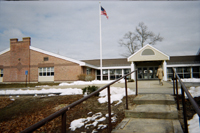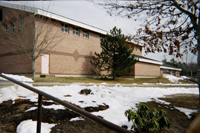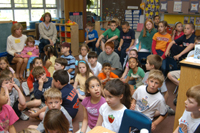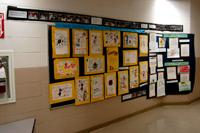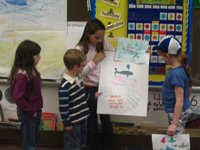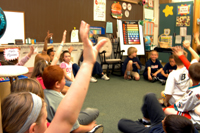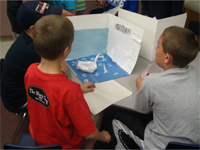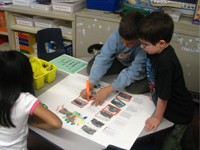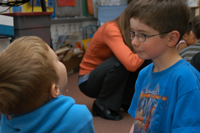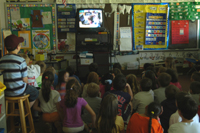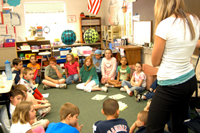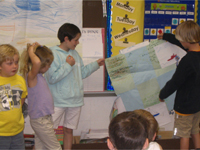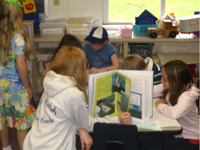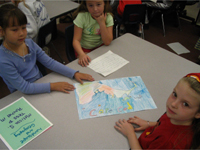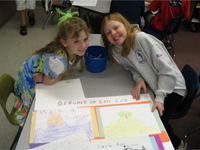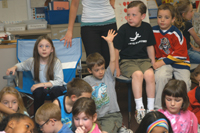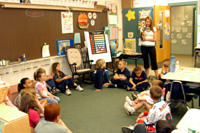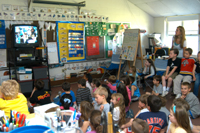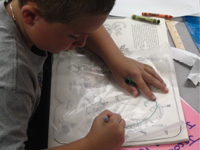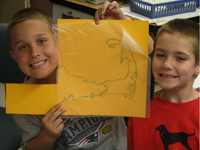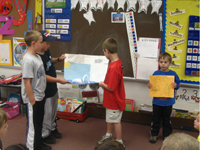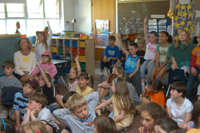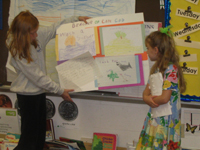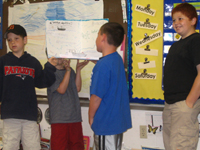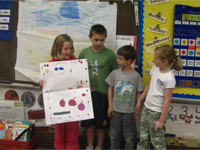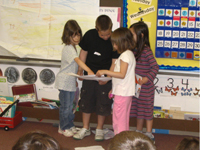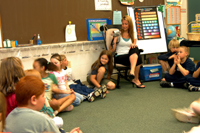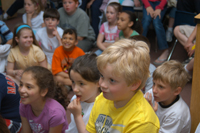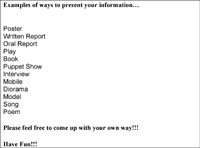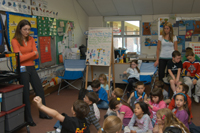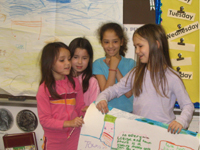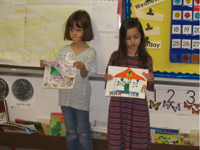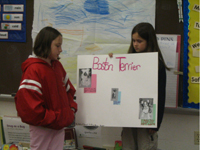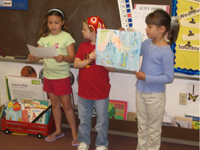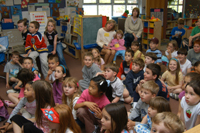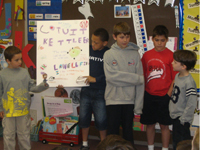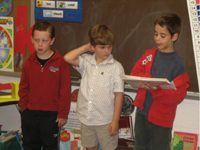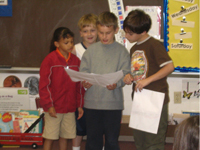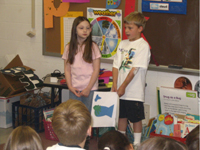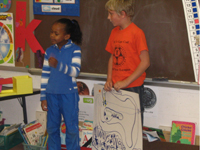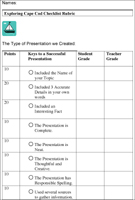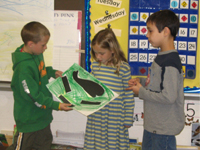Marstons Mills East Horace Mann Charter Public School is located on Cape Cod, MA in the village Marstons Mills. The school houses 400 students, Kindergarten through Grade 4. The 2005/2006 school year was our second year as a Horace Mann Charter School. Throughout the past two years, we have worked to implement the Accelerated School PLUS? model by creating Powerful Learning opportunities for all students.
Documentation Examples > Documentation Exhibition
Moving Towards Our Charter's Mission Through Responsive Reflection
School: Marstons Mills East Horace Mann Charter Public School, Marstons Mills, MA
1. About Our School
The mission of Marstons Mills East Horace Mann Charter Public School is to be a whole school community that provides a challenging and enriching learning environment for all children Kindergarten through Grade 4; and where all children achieve high academic standards and develop character. We support the whole child and continuous improvement in the teaching process, and consider a whole school community as integral to success.
2. Three Principles
Accelerated Schools are based on the following three principles:
UNITY OF PURPOSE ? The whole school community decides on the goals for the school which become the target for everyone?s efforts. Everyone in the school is pulling in the same direction.
EMPOWERMENT COUPLED WITH RESPONSIBILITY ? All members of the school community help to make important educational decisions, share responsibility for implementing those decisions, and share responsibility for the outcome of those decisions.
BUILDING ON STRENGTHS ? There is a commitment to looking for and building on each person?s strengths in the school community.
3. Past Projects
Our first two projects for this group of sixty-five students were teacher driven. Our goal was to create mixed?age and ability groups by placing a student from each grade level into each group (K-3). We the teachers planned the activities for each meeting and decided upon the end products, which all groups were expected to complete in a similar manner. During these projects we had begun to utilize documentation (video tape and photographs) and group reflection. We noted that our students? reflections seemed superficial and simplistic. (?I liked the detail they used?; ?It was fun.?)
In an effort to make our final Book Buddy project student driven, we implemented the Components of Powerful Learning, and utilized Documentation and Reflection.
4. Components of Powerful Learning
The Components of Powerful Learning has been strongly promoted by our charter school?s Accelerated Schools Plus Model and encompasses the following:
Authentic
? Every student demonstrates his/her learning through the creation of authentic products and performances.
? Learning applies to student real life situations or issues.
? Teachers assess the learner?s life experiences, knowledge, goals, and interests and use this data to design learning activities
? Instruction includes and makes use of the cultural and family traditions of the students and/or community
? Instruction includes the vocabulary, methods, and/or activities of the work world or the discipline
? Teacher takes advantage of teachable moments.
? Students reflect on their work and learn from their mistakes
? The school exhibits and celebrates student learning with the community
Interactive
Every student is engaged in interactive and collaborative activities to share knowledge and expertise or to complete projects.
? Teachers? dialogue with students develops critical thinking
? Students constructively critique their own and each other?s work.
? Students interact with a learning community that exists in and outside the school through field-based experiences and/or technology.
? Teachers build family-student interaction into the learning and assessment practice.
Learner-Centered
? Every student is empowered to make choices in his/her learning.
? Students? strengths and interests are identified and used to plan instruction and curriculum.
? Students are involved in the planning of instruction.
? Most of the displays around the school are student work that shows originality, creativity, and higher order thinking
? Classrooms are set up so each learner can independently access and use materials, books, equipment, and reference materials.
? Learners are guided to manage time and resources effectively.
Inclusive
? Every student is engaged in differentiated content, process and products based upon her/his needs, interests, and strengths in order to accelerate learning
? Students demonstrate their learning using a variety of learning styles and intelligences.
? Assessment is used to determine a variety of instructional approaches in each unit and lesson.
? The school and each teacher provide opportunities for students to extend and accelerate their learning, to assess their work and follow-up on individual interests.
? All students participate in enriched and challenging learning experiences.
Continuous
? Prior knowledge is assessed in order to engage every student in instructional activities and make connections between various subjects and contexts.
? Teachers integrate state, district, and/or school standards to plan curriculum.
? Throughout the school, there is a spiraling strand of curriculum from one year to the next that builds on prior knowledge in order to deepen the levels of student thinking.
It is believed that when implemented effectively, Powerful Learning increases students? commitment to learning, their level of engagement and ultimately their level of achievement. We hoped that through this process, our students reflections would become more substantive and encapsulate their thoughts in a more profound way.
5. Documentation and Reflection
We utilized video tape and photographs to document our group experiences. This documentation was reviewed and analyzed by the whole group to encourage reflection and to initiate change.
The timeline which you are about to see chronicles the power of reflection and documentation during a student-driven, powerful learning experience.
6. Brainstorming Topics
Selecting our Topic
In order to align our topic with the Kindergarten to Grade 3 Massachusetts Curriculum Frameworks we the teachers chose the broad topic of Cape Cod (authentic).
Students brainstormed the following sub-topics in small groups (learner-centered and authentic):
? Water Sports/Activities ? Places to Visit ? Cape Cod People ? Sea Life ? Services/Jobs/Occupations ? Schools ? Towns and Villages ? Shops on Cape Cod ? Sports ? Landscape/GeographyStudents then selected their own research topic based upon their personal interests. Students were grouped based upon their topic of interest, rather than grade level (interactive and learner-centered).
As the students researched their topic they utilized the many resources available (learner-centered and interactive):
? Computers ? Internet ? Library ? Cape Cod Books ? Adults and Peers ? Brochures ? Travel Guides ? Maps ? Their own knowledge of the area
7. Kindergarten Reflections
May 6, 2006 Kindergarten Reflections:
?I didn?t really do anything. The big kids mostly did everything. We hardly did anything except look at books.? - Kindergarten Student
?What could we do to help Rachel?s group work better?? - Kindergarten Teacher
?Is this something Ms. Hurley or Mrs. Keenan or I need to let the groups know that some kindergarteners are ready to do more? Or is this something you might like to try talking to your buddies about without teacher help?? - Kindergarten Teacher
?I think I could try letting them know.? - Kindergarten Student
?What did you think about the size of the groups this morning?? - Kindergarten Teacher
?I have three kids and it?s smaller and it worked good.? - Kindergarten Student
?I was in a big group and it didn?t work really good." - Kindergarten Student
?I was in her group and there were seven, not six and it was a lot. I was getting a little squished. And William kept saying that I should skooch over and I was squished so I couldn?t.? - Kindergarten Student
?Ben and Meghan were right at the computer and I couldn?t see. I couldn?t see at all.? - Kindergarten Student
?Does anyone have an idea of what size group would be best for this kind of work?? - Kindergarten Teacher
?It would be better to have a smaller group so that you wouldn?t feel squished and you wouldn?t feel left out.? - Kindergarten Student
?Okay, do you have a number that you think is a good size for the group?? - Kindergarten Teacher
?Three.? - Kindergarten Student
?I think a good size of the group would be four.? - Kindergarten Student
?So maybe we?ll say that the limit is four? No more than four? Raise your hand if you think three or four in a group is a good size for a group?? - Kindergarten Teacher
Consensus Achieved!
8. May 23, 2006 ? Teacher Reflections
Teacher Reflections/Reactions to Video Tape of Previous Book Buddy Class:
Observation: Students are spending a lot of time trying to get to first website.
Response: Have folders for groups at tables with computers already at appropriate website.
Observation: Placement of computers at the end of the table makes it difficult for all to gather round and to participate in the discussion.
Response: Place computers on long side of table.
Observation: Groups don?t have time to process/share/document information prior to moving back into the large group.
Response: Stop research earlier to give groups time to process information.
Observation: Some of the Kindergarteners are still having difficulty joining the group and becoming actively involved.
Response: Provide paper, crayons and pencils to the group so that they can draw their research findings rather than rely upon others to write for them.
Observation: A student expressed feeling tired of writing on behalf of the group.
Response: Paper, pencils and crayons will allow and encourage others to help with note taking.
Observation: There were 65 participants and no observable behavior problems during this activity!
9. May 24, 2006 ? Whole Group Reflections
?Who remembers what a reflection is?? - Teacher
?It?s when you go back and remember what you did before.? - Third Grade Student
?When you do something and then another time comes and you look back at it.? - Multi-Age Student
?It?s like looking in a mirror.? - Kindergarten Student
?You?re not always looking at what you looked like, but what you did.? - Third Grade Student
?Also, it?s when you get to see the funny things that you did, like when you didn?t even know the camera was on you.? - Multi-Age Student
?In the video, it sounds really loud, but when we are working, we don?t hear all the noise.? - Multi-Age Student
?I thought I looked pretty.? - Multi-Age Student
?Everyone was working hard.? - Third Grade Student
?My group was doing one thing, like someone was on the computer, and someone was writing and someone was reading a book.? - Multi-Age Student
?So, are you saying that everyone seemed to have a job in your group and every one was very busy because someone was on the computer, and someone was writing and someone was reading a book? Did that just happen or did someone decide that.? - Teacher
?We all just agreed.? - Student
?In some of the groups the third graders were doing a lot of the work and other kids were not working.? - Third Grade Student
?I noticed that in some of the groups the third graders helped the other kids when they appeared not to be doing quite as much as the third graders. Sarah would try to involve them?? - Parent Volunteer
?Some people were maybe just sitting there watching and I told them, okay go find a book and then Meaghan and Ben were looking through a book. And Rory was looking at a web page. ? - Third Grader
?We realized that not all of you write, but often times, to show what you know, you draw. So, next time we get together we will be sure to have pencils, crayons and paper to draw what you know. We are inviting you to use your way to show what you know to your group members.? - Teacher
10. May 31, 2006 ? Reflections
Giving permission to reflect upon the negative:
?The other thing I want you to think about with a reflection is this? When you look in the mirror, like let?s say you just got out of the bed in the morning and your hair is all blah and you have some sleepy seeds in your eyes? When you look in the mirror, does it always have to be to see the good? Do you always love what you see?? - Teacher
?No.? - Students
?That?s right. You don?t always have to see the good when you reflect. So, (for today) if there is anything that you think we need to change or do differently, it is okay to share that too?? - Teacher
?Well, I didn?t like it that I had to do all the writing in my group while all the other people in my group watched me do it.? - Multi-Age Student
?Will was touching me!? - Kindergarten Student
?Oh, so maybe your group needs to come up with some rules about touching each other.? - Teacher
?Did everyone find information easily? Was it easy to find information about your topic?? - Teacher
?Our topic was kind of hard to find on.? - Student
?What did you do? How did you try to solve that?? - Multi Age Teacher
?We?ll talk more about that and see if we can come up with ways to help you.? - Multi Age Teacher
?As your teachers we learn every day from you, by watching you and seeing the work that you do, and that is something that we notice too, that it was a little difficult for some of you to find the sources you needed so we will work on that.? - Teacher
?We all took turns writing.? - Student
?Our group was working together and we found on the Internet a place were they have all kinds of schools, and we found Mike?s school and my old school.? - Student
?Your old schools?? - Teacher
?Yes.? - Student
?Oh wow! Were there pictures of them?? - Teacher
?Yeah.? - Students
?Awesome guys!? - Teacher
11. June 1, 2006 - Sharing
?We realized after watching the last video that we have not given you time at the end of your research time with your group to share what you have learned. So today, at the end of your research time, you and your group members will stay where you are, and you?ll share the information you have gathered today with one another. That way you can learn from one another, and you will not lose the information you have collected.? - Teacher
12. Final Projects
?I typed up a list of the ways that you might want to present all the information you have been looking up. Can anyone think of an idea of how you could present? ?? - Teacher
Students brainstormed:
? ?A poster? ? ?A book? ? ?A play? ? ?A catalogue? ? ?A poem? ? ?A script? ? ?A magazine?
?I?m going to put one of these lists on every table? Down at the bottom, it says if you can think of another way, like a catalog, you can do that!? - Teacher
13. June 1, 2006 ? Teacher Reflections
Teacher Reflections/Reactions to Video Tape of Previous Book Buddy Class:
Observation: Students who appeared to be less engaged in prior video are now using the paper, pencils and crayons to document their findings. The level of engagement has increased; children appear to be involved and happy!
14. Preparing for Presentations
Our Last Day Together
As we reviewed the morning schedule and our expectations, in preparation for our students? final time together, our students? excitement was difficult to contain. It was clear that they were eager to join their buddies and to get to work!
As they began their work we teachers floated from group to group, offering our support. Soon after, we realized that we were no longer needed! Every group had a plan for how they would present what they learned and knew exactly what they wanted to share. It was remarkable!
Our morning ended with each group presenting their final product to the larger group. Every group incorporated at least three facts and presented them in a variety of ways which were reflective of the group member?s unique abilities, interests, strengths and personalities. We saw skits, posters, dioramas, and written reports.
During some presentations, kindergarteners or first graders from the groups emerged as the lead spokespersons and at other times, the older students took the lead. More reserved or shy students who we had felt concern for at the beginning of our project now stood tall and proud in their roles as fully involved members.
15. Final Reflections
?Let?s do a bit of reflecting before we do our clean up. Does anyone have any thoughts on how this went? When you think back on working on this project, the research, listening to your friends, even deciding today who was going to do what?? - Teacher
?Well, we started out with nothing and then as we worked it became huge-er and huge-er.? - Multi Age Student
?I would have felt kind of bad if I didn?t get to draw.? - First Grader
?It was good to have the stuff out to make a picture.? - Kindergartener
?I didn?t know my buddies when we started and we started to work together and to like each other and now I have friends.? - Kindergartener
?When I get the crayons, I had something to do.?
?It felt good to be surrounded by people you know.? - Kindergartener
?I liked how we worked as a team and we did something that we liked to do and we all worked together and did different things.? - Kindergartener
?It felt good to be in what you want.? - Third Grader
?We got to make what we wanted to make!? - Multi Age Student
?Now my buddy feels like a cousin.? - Kindergarten
?It felt good to work with our buddies every Thursday because now I am not afraid to work with bigger kids.? - Kindergartener
16. Teacher Reflections
During the previous projects we were concerned about a few students? behavior. They were disengaged from their group and at times disruptive.
As we began our student-driven Cape Cod Research Project, we realized that these same students were fully engaged and excited to be working hard.
We attribute these significant changes to the fact that the project was student-driven, based upon each individual?s interests and to our sincere attempts to listen and respond to the insightful reflections.
After viewing our students? final projects, listening to their presentations and reviewing their ?Exploring Cape Cod Checklist Rubric? we discovered that all had demonstrated a high level of engagement and achievement. This was reflected in their ability to articulate their thoughts during our Final Reflections.
Not only were students able to complete the tasks as prescribed in the rubric, but they were also able to speak at length about their experience as a member of a group; and clearly and accurately share the Cape Cod facts that they had learned.

